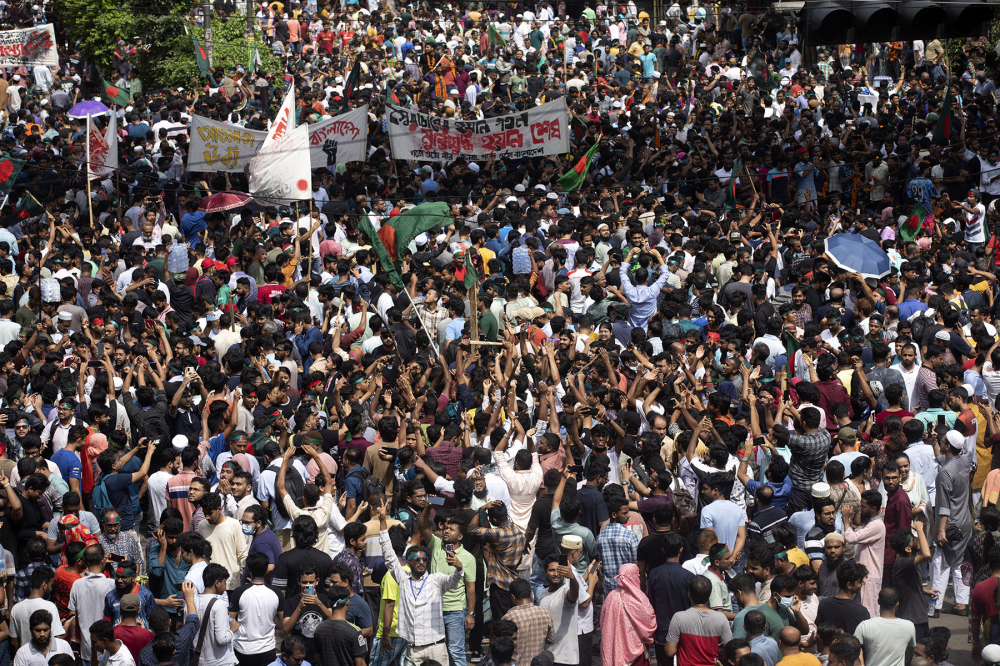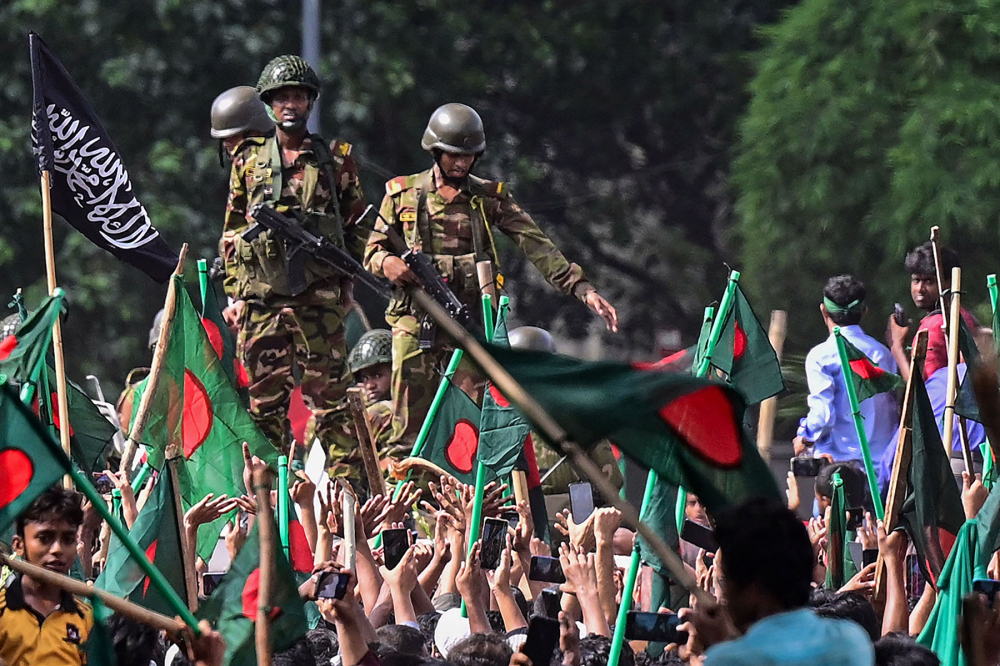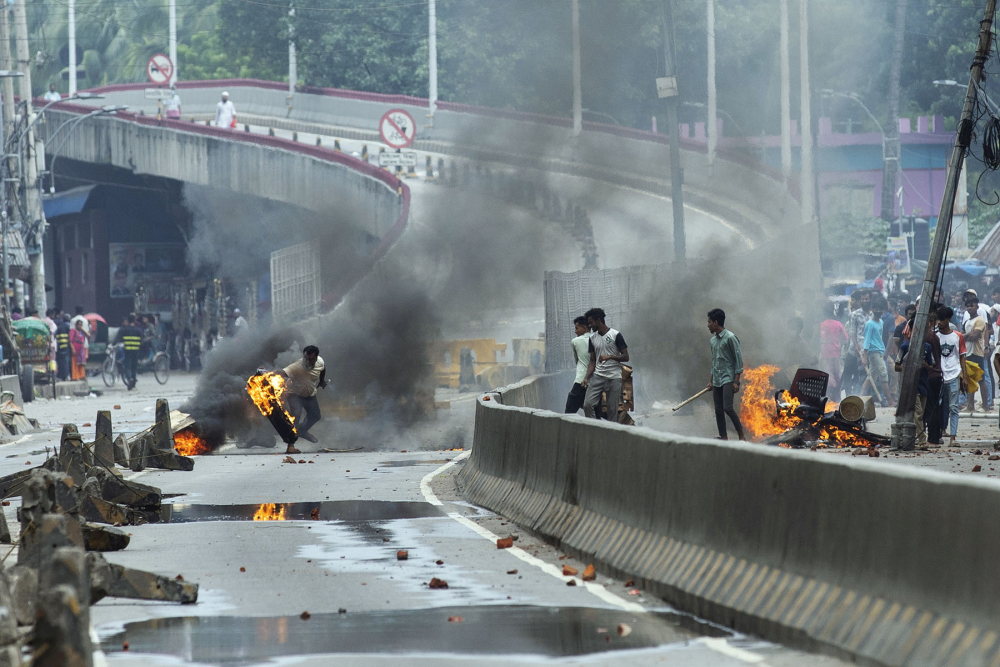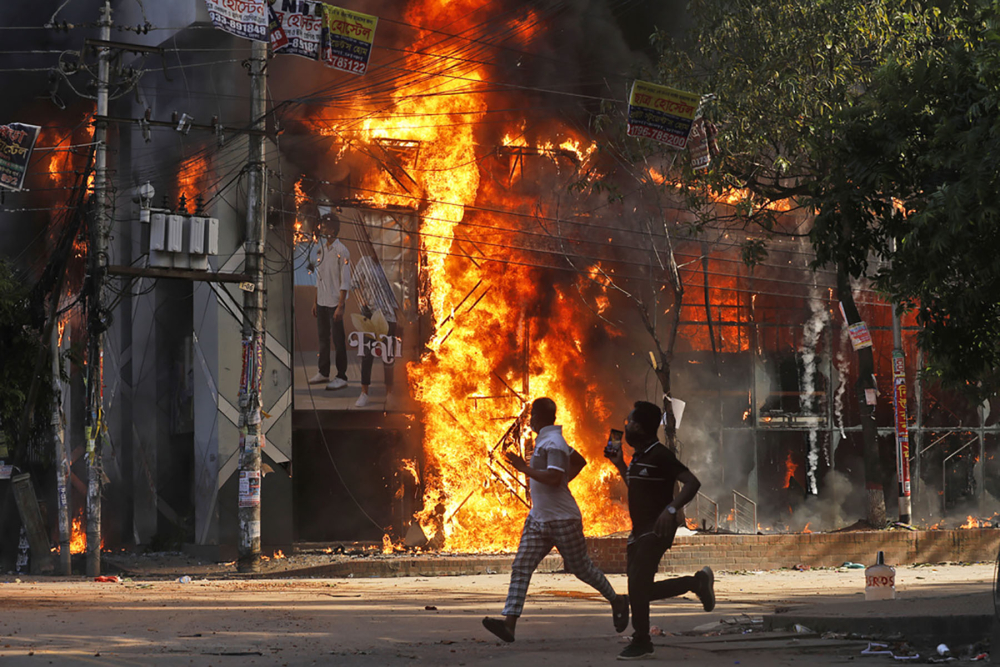Sheikh Hasina: The Fall of 'Democratic Dictatorship'

We use Google Cloud Translation Services. Google requires we provide the following disclaimer relating to use of this service:
This service may contain translations powered by Google. Google disclaims all warranties related to the translations, expressed or implied, including any warranties of accuracy, reliability, and any implied warranties of merchantability, fitness for a particular purpose, and noninfringement.

Highlights
- Hasina was growing up under the guise of democracy and was becoming the image of a dictator. of one's own karma As a result, he had to flee the country on Monday.



Sheikh Hasina, who ruled Bangladesh for 15 consecutive years, fled the country on Monday after her life was in danger due to her anti-government protests. She reached India on Monday and is preparing to go to London from there.

There is now a rejoicing in Bangladesh due to the joy of his exit from the country with power. Sunday's very violent After about 100 people were killed in the clash, the protest became more intense on Monday. Despite the countrywide curfew, Hasina left the country after the protest led by the students intensified.
Sheikh Hasina, who emerged as a more powerful prime minister after the election of last month, is responsible for the downfall of her governing style. How did Sheikh Hasina, who fought for Bangladesh's democracy, end up leaving the country following the dictatorial path under the guise of democracy? For this his The past must be dug .
===================
On August 15, 1975, four years after independence from Pakistan, Bangladesh's second-ranking officers staged a military coup. Its objective was clear, to replace the secular government led by Sheikh Mujibur Rahman and form an Islamic government under the leadership of Khondkar Mushtaq Ahmad.
Prime Minister and father of Bangladesh Sheikh Mujibur Rahman and most of his family lost their lives during the successful military coup. His two daughters Sheikh Hasina and his elder sister Sheikh Rehana managed to escape as they were in West Germany.
After losing a family member, they took refuge in the house of the Bangladeshi ambassador in West Germany. They later took political asylum in India at the call of Indian Prime Minister Indira Gandhi. Hasina stayed in India for about 6 years after the military rulers banned her from returning to the country. She returned to Bangladesh on 17 May after becoming the president of Awami League on 16 February 1981. At that time, he was welcomed by thousands of supporters.
Hasina's father Rehman played a leading role in the independence of Bangladesh from Pakistan in 1971. Rahman carried the dream of Bangladesh's self-respect and independence. However, after his murder, Hasina entered politics with the same dream.
She has been active in politics since becoming president of the Awami League in 1981. In the early days, she fought for the establishment of democracy in the country. After returning from exile to Bangladesh, she became associated with BNP leader and former Prime Minister Khaleda Zia. The movement in 1990, led by two leaders, succeeded in ousting the military regime of Hussain Mohammad Ersad in Bangladesh.
After the establishment of democracy, Zia held power for five years from 1991 through general elections. However, in the meantime, the relationship between Hasina and Zia became strained. Because of this the politics of Bangladesh became unstable.
Hasina became the Prime Minister for the first time in 1996. Five years later, she was defeated by Zia. Because of this, Zia became the prime minister again from 2001 to 2006. Meanwhile, relations between the two leaders deteriorated further. The conflict between them was not limited to political competition, but began to move towards revenge.
The army took power after scheduled elections could not be held due to protests, violence and clashes with political vendettas between the two leaders. Later, Army Chief General Mohin Uddin Ahmed appointed Economist Fakhruddin Ahmed as Chief Advisor to lead the caretaker government.
The Ahmad-led government jailed Zia on corruption charges and Hasina on extortion charges. After the case was withdrawn, Hasina was released in June 2008 and Zia in September. Hasina became the prime minister after the Awami League won the elections on December 29 of the same year by a landslide. She has been in power continuously since 2009. However, the conflict between the two leaders was increasing.
The conflict between Hasina and Zia, known as the 'Begum-Yuddh', dominates the politics of Bangladesh. At the same time, the behavior of Hasina, who had put her life in the palm of her hand for democracy for more than four decades, was changing. In the last four terms, he has been criticized for continuously moving from a democrat to a dictator. was happening . Let's say more, since 2014, Hasina's revenge against the opposition including Zia has been on the rise .
In January 2014, he was criticized at the international level after he was elected as the Prime Minister for the third time through the election rejected by the opposition party. In 2018, he was elected as the Prime Minister for the fourth term, and the opposition accused him of rigging. However, those accusations had no effect on Hasina. 
Election majority amid boycott of the opposition
The parliamentary election held last December was also boycotted by the main opposition party Bangladesh Nationalist Party (BNP) raising the question of fairness. It was natural for the international world to question the credibility of the election boycotted by the opposition. However, like the previous elections, this time also Hasina conducted the elections amidst the boycott of the opposition. Prime Minister Hasina's Bangladesh Awami League won the election. She became the Prime Minister for the fifth time (fourth time in a row) from the election.
After becoming the Prime Minister, she called BNP, which boycotted the elections, a 'terrorist organization'. He said that there was no need to prove the credibility of the election in the first press conference after the results were announced.
There are 350 MPs in the Caste Parliament (National Parliament) of Bangladesh. Last December Elections were held in 299 constituencies. After the death of an independent candidate, the election of Navgaon-2 was postponed. The remaining 50 seats were reserved for women. In that election Hasina's party won 223 seats. After Awami League, independent candidates won more seats. Independent candidates won in 61 areas. The main opposition caste party in the parliament has shrunk to 11 seats. Earlier in the elections held in 2018, Awami League had won 258 seats and Jati Party had won 27 seats. The turnout in the
election was less than 40 percent. BNP did not accept rigged elections. The BNP, which boycotted the election, had been demanding Hasina's resignation and a neutral agency to be entrusted with conducting new elections to solve the problem. However, Hasina had been refusing the demand.
In addition, the opposition was accused of inciting anti-government demonstrations. According to the report of the international news organization AFP, 300 people were killed until Monday in the protest.
The politics of revenge
Hasina and the opposition have been blaming each other for the protests and violent clashes. Hasina continued to take revenge on the opposition party workers. The work of arresting opponents and opponents and making false cases has intensified in recent days.
Senior leaders of BNP sent to jail . Zia's eldest son Tariq Rehman is in exile in the UK. Zia, a longtime rival, was sentenced to 17 years in prison in 2018 in a corruption case. The international community has been raising questions about Hasina's regime and Zia's prison sentence.
The US State Department cited international and Bangladeshi legal experts in 2020 and said that the case was filed with the aim of separating Zia from the political process without sufficient evidence. Similarly, Amnesty International also noted that the 'right to a fair hearing' was not given. Zia was shifted to the hospital for treatment in 2019 after her health deteriorated. In March 2020, he was released for 6 months with conditions not to leave his home, participate in the political process and travel abroad. Since then, the deadline has been extended for the sixth time and he is under house arrest. After Hasina's exit on Monday, Zia appealed to the citizens of Bangladesh to remain calm.
Hasina took revenge on Nobel Peace Prize winner Mohammad Yunus. The local court sentenced him to 6 months in prison last December on the charge of violating the labor law. International human rights organizations protested that the charges against Yunus were state-sponsored. After Hasina's exit, Yunus responded on Monday that another freedom movement in Bangladesh was successful.
Journalist and famous photographer Sahidul Alam was imprisoned for 107 days on charges of spreading confusion and violence against the state. In an interview with Al Jazeera television, Alam accused the Hasina administration of violating human rights and stifling freedom of expression. Protests against Alam's arrest were held across Bangladesh. The arrest of Yunus and Alam was taken as Hasina's move to ban opposition voices in Bangladesh.
Although Hasina is a smart politician, some analysts have been commenting that her working style is a headache for the entire democracy. There were many who said that the election held last December was only for formalities.
Professor Anu Mohammad of Jahangirnagar University Publishing an article in the Daily Star He said that even though the election was held in the name of constitutional continuity, its dramatic and predictable nature made the ruling and wealthy class more powerful. Awami League is coming back to power with the election results. But, are they really the representatives of the people?' was his question. They say that the election held in such a situation is only a way to reach the destination of a dictator by riding the horse of democracy.
Hasina made the opposition party BNP join the election The election would have gained more legitimacy. However, she did not do so. As a result, his democratic personality was questioned.
Awami League and BNP joined forces in 1990 to protest against the then military ruler. But, In that election The two parties got into a dispute. 
Corruption and Scams
During Hasina's tenure as Prime Minister, there were many scandals and scandals. Padma bridge scandal, Hallmark Sanali Bank scandal, Stock market scandal, Ranam Plaza collapse and Bangladesh road safety movement are the famous scandals of his rule.
The Padma Bridge project, which was withdrawn by the World Bank after allegations of corruption, was completed by Sheikh Hasina's government with internal resources. Last Inaugurated in June, the bridge connects the southwest region of Bangladesh with the capital, Dhaka. In 2015, the World Bank canceled a $1.21 billion loan agreement following allegations of corruption. After that, the Asian Development Bank and the Japan International Cooperation Agency also withdrew from the project.
Prime Minister Hasina announced that the bridge will be built at the government's expense after everyone shook their hands. However, he was criticized saying that such a big project could not be done without the help of donors. She replied during the inauguration of the bridge, "Some people say that we are always dependent on others. But, you are with me, so I have the courage to make the impossible possible.' She said that the father of the nation, Sheikh Mujibur Rahman, taught the importance of self-respect, and said, 'No one can suppress Bangladesh. Padma Bridge is not just a pile of bricks and cement, it is also a symbol of Bangladesh's pride, honor and efficiency.
Earlier this month in Bangladesh
Students protested against the continued reservation and quota system in government jobs . After violent clashes, the government abolished the quota system, but the seeds planted by the movement did not die. In Bangladesh, there is a provision of reservation for women, ethnic minorities and physically challenged people in some government posts. A third of the posts were reserved for children of men classified as 'wartime heroes'. The protesting students protested saying that the system is discriminatory and that government jobs should be filled based on merit. 
After the protests in 2018, the Hasina-led government abolished such reservation system. But after the court reinstated such a system last June, the students started protesting again. In opposition to reservation Hasina spoke unreadably in the movement that started.
The Supreme Court of Bangladesh suspended the current reservation system for a month. But until the said system is abolished, the student movement continues kept . The case was being heard in the court on August 7. But before that with the protestors Police And there were clashes between Awami League workers. As the incident began, the demand for movement focused on the resignation of the movement and nbsp;.
protesters called for Leng March to eraded to August 6 to degraded Millions of people to Dhaka for August 6 and nbsp;. But Saturday and Sundays took the Sheikh Haikle after taking a violent turn and escaped and nbsp;. How can eliminatitism and decentras that grow in a democratic covering, and Nbsp;. & NBSP; Story-prepared materials prepared by the help of stories of stories of stories and agencies] with the support of the agency and agencies]. 
 प्रकाशित : श्रावण २१, २०८१ २१:२८
प्रकाशित : श्रावण २१, २०८१ २१:२८

 ३०.१२°C काठमाडौं
३०.१२°C काठमाडौं














